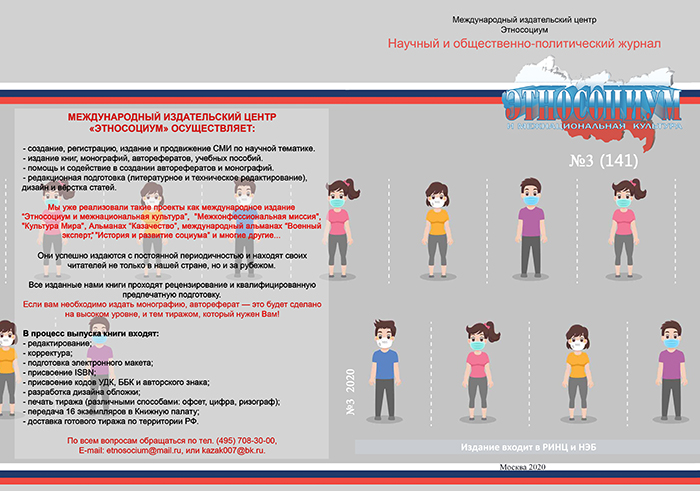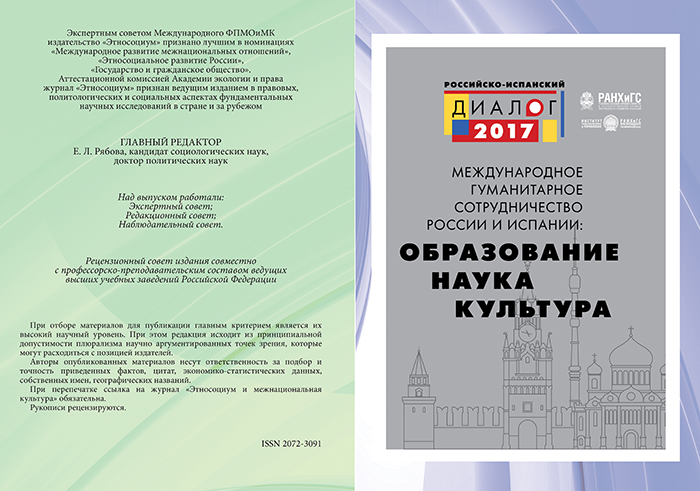

Content
|
COUNCIL OF INTERNATIONAL RELATIONSHIP
|
|
|
Mikhaylova N.V., Voronovskaya P.I. Current aspects of political consulting in Russia
|
9
|
|
Baykhanov I.B. Problems of the development of an elitivistic paradigm
|
18
|
|
ACTUAL PROBLEMS OF MODERN SOCIETY
|
|
|
Peter Shpeko, Gryaznova V.N. State personnel policy as the basis for achieving the development goals of the Russian Federation in modern conditions
|
27
|
|
Ternovaya L.O. People die for metal: the metallic taste of geopolitics
|
37
|
|
REGIONAL STUDY
|
|
|
Rybakov S.V. Image portrait of Yekaterinburg against the background of history and geography
|
48
|
|
INTERNATIONAL RELATIONSHIPS
|
|
|
Bajora A.F. Social-cultural integration of gagauz people in moldovan society (part two)
|
59
|
|
Demidova E.N. Style of Political Role's Performance on the Example of Mao Zedong
|
65
|
|
Shchuplenkov O.V., Shchuplenkov N.O. Replacement Migration Policy in Germany
|
68
|
|
REVIEW
|
|
|
Bormotova T.M., Danakin N.S. Famous Trademarks: From Social Foundations to Social Implications
|
80
|
|
Ryabova E.I. Gender Equality: The Way to Matriarchy or the Triumph of Justice
|
82
|
|
Abstracts
|
90
|
|
Authors
|
99
|
|
Requirements to materials submitted to the international publishing house "Etnosocium"
|
101
|
The article discusses the current problems of political consulting in Russia. The study analyzes the sphere of political consulting in Russia, which allowed us to highlight a number of characteristic features. The political consulting in the article is analyzed in historical retrospect to highlight its unique specific features. The special professional skills required for Russian political consultants are identified. The study also highlights the main obstacles to the successful development of political consulting in Russia. The activity of political consulting in the context of young Russian democracy is analyzed.
Keywords: political consulting, political consultant, election process, party in power.
The author seeks to consider the formation and functioning of modern Russian elites from a methodological perspective. The historical continuity of elitogenesis is associated with the presence of both general principles for the formation of a separate social group that has access to power and the emergence of fundamentally new forms of education for the Russian elite. In modern conditions, according to the author, there is a forced period of transition to the stage of elitogenicity.
Keywords: elitology, elitological paradigm, egalitarian paradigm, elitogenesis, marginalization, proto-elite community, meritocracy, meditocracy.
The article is devoted to determining the nature and characteristics of the state personnel policy in modern conditions. The importance of an effective state strategy in the formation, rational use, relevance and development of the human potential of society in the digital economy is emphasized.
Keywords: state personnel policy, national projects, digital economy, personnel competences in the digital economy.
The article analyzes the poorly studied side of the geopolitical assessment of the potential of states and the role of their leaders, which is one of the first civilization indication systems associated with metals in the history of mankind. Metallic characteristics appeared in geopolitical vocabulary as the list of metals that mankind possessed expanded. Despite the availability of people of the XXI century. almost all the elements of the periodic system of chemical elements, to assess the role of certain politicians and the meanings of specific historical periods, the metals that people recognized in the ancient period are still used. This indicates the archetypal nature of geopolitical thinking, the presence of a desire to confirm both ideologically and materially such a picture of the world in which the state would feel maximum geopolitical comfort.
Keywords: geopolitics, world economy, history, symbols, metals, statesmen.
The article reveals the role and significance of image characteristics in the socio-economic and cultural development of modern cities, defines the tasks of branding technologies, and names their target audience. It is shown that the tourist attractiveness of territories depends to a large extent on the activation of historical artifacts. On the example of Yekaterinburg, the potential of using geographical and cultural-historical factors is revealed, and the reserves in branding this city are noted.
Keywords: image, brand, branding technologies, Yekaterinburg, tourist attraction, historical artifacts, Peter I, Catherine I.
This study is based on the works of international scholars on cultural identity and sociocultural integration, such as Erik Erikson, Peter Dahlgren, A. Touraine, R. Redfield, R. Linton, M. Herskowitz, I. Goffmann, A. Schütz, M. Bennet, A. Farnham, S. Bochner, G. Triandis, J. Berry and consists of two parts. Each part is a logical continuation of the study: the legislative framework, the strategy, the protection and promotion of the integration of ethnolinguistic groups from the moment the Republic of Moldova was formed to this day. The article gives an assessment and main conclusions on the ongoing cooperation between the Government of the Republic of Moldova and international organizations on solving the problems of integration of the Gagauz people and actions to provide them wide territorial autonomy.
Keywords: The Republic of Moldova, Gagauz people, cultural identity and sociocultural integration, protection and promotion of the integration of ethnolinguistic groups, people's right to self-determination and territorial autonomy.
Studying of political leadership for the purpose of creating a typology, main aspects of the each type, discovering causes of the incorrect decisions, constructing a model of the effective leader is a relevant academic field. The given article is dedicated to examination of one of the four political leadership's types through the prism of M. Hermann's classification on the example of Mao Zedong. In the article is examined the style of political role's performance, giving consideration to the fact, that acting in difficult historical circumstances, Mao Zedong demonstrated the whole spectrum of leadership traits and gained a complex of authorities which allowed him to concentrate a considerable amount of political power in his hands. The author comments upon peculiar to Mao Zedong eloquence which empowered him to influent masses. In addition, the article scrutinizes Mao Zedong's promotion of his own political program of actions and vision to achieve goals in the course of forming socialism with Chinese characteristic qualities. The author demonstrates that in his style of leader's role performance Mao Zedong belonged to the Crusader type of leadership inasmuch as he offered China a new national idea. Besides, in the article is mentioned that Mao Zedong as a political leader possessed exceptionable charisma which enabled him to force ideas which were not compatible with Chinese realities into the mass conscious and, by doing that, provided himself an extensive social support from hundred millions citizens of RPC who trusted the political reader with realization of ideas which were entirely extraneous to their interests.
Keywords: political leaders, carriers of the power, statesmen, functions of the leader, influence of leaders.
The article discusses the economic and social aspect of the German migration policy at the present stage. The contradictory nature of the adaptation of migrants to German society is emphasized. Germany has a peculiar, historically developed experience in relations between the state and the faiths represented in the country: they are settled at the level of official agreements. Immigration law governs relations between new arrivals and indigenous peoples. The socio-political problems facing the country require new approaches to their solution, and Germany is ready to solve them.
Keywords: demography; integration; islam; migration; politics; shelter; work force.
Monograph Batykova I.V. on the topic: “Well-known trademarks: from social grounds to social consequences” is an independent scientific and qualification work, makes a certain contribution to the development of the theory of the organization of activities related to well-known trademarks, from the point of view of the social characteristics of this kind of designations, as well as problems , emerging in the practice of sociological examination, has practical value, contains elements of scientific novelty, meets the basic requirements, it is recommended to print.
Keywords: Trademarks, design, society, society, state, development, contribution to development, press, requirements, expertise, consequences.
Gender equality: the path to matriarchy or the triumph of justice (response to L. Ternova’s monograph “Gender Sociology: Women's Movement in Answers to the“ Women's Question // M.: INFRA-M, 2020)
Gender issues are increasingly attracting the attention of a wider circle of specialists. At the same time, gender sociology remains a peculiar core of all such studies. This is determined by the inclusion of gender in one of the components of the essence of the historical movement of society.
Keywords: social reality, gender, gender equality, employment, mass movements.